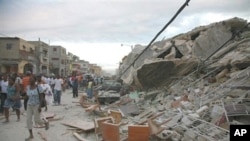The U.N. Deputy Secretary-General said Thursday that Haiti's financial picture is bleak and that the country urgently needs post-earthquake pledges that it can quickly use as cash. Asha Rose Migiro just returned from a two-day trip to the Caribbean country, which suffered a devastating earthquake three months ago.
In a closed-door briefing to U.N. member states, the deputy U.N. chief said Haiti's government coffers are "empty." She appealed to nations that pledged more than $5 billion for Haiti's reconstruction at last month's donors' conference to quickly convert those promises into cash.
She said the money is needed to undertake the most critical tasks of recovery, while preparing for the long-term job of rebuilding the country.
U.N. Secretary-General Ban Ki-moon dispatched Asha Rose Migiro to Haiti earlier this week to check on progress in meeting needs such as food, sanitation and shelter, as well as conditions in the camps housing the country's more than one million homeless persons, in the wake of reports of sexual violence.
At a news conference, Migiro said law and order is a challenge for Haiti's government, which lost many police officers in the January quake. She said increased camp security for women is needed to prevent gender-based violence. "They definitely need greater and stronger support, and greater and stronger protection, particularly from sexual violence and other forms of abuse," she said.
Migiro said there were problems of sexual violence in Haiti before the earthquake, but that they have been exacerbated now with so many people living in such close quarters and with little privacy. She also cited the escape from the national prison of hundreds of violent criminals during the quake, many whom remain at large.
Migiro said U.N. and Haitian police are working together and patrolling many of the most at risk places. But she said some residents are taking security matters into their own hands. "In camps, also, the women are organizing themselves. Some of them are doing some sort of patrol. But also to have young men who are interested in protecting families. So they are organizing and they are taking what I might call 'first aid' steps within the camps," she said.
Migiro said that in the long-term, the Haitian government plans to train its police officers to deal with sex-related crimes and that the parliament is looking at strengthening sexual violence laws.
On the humanitarian front, Migiro said the United Nations and partner agencies are working to meet the massive need for food and sanitation, as well as housing that is able to withstand the rainy season. Although the situation is grim, she said the Haitian people are yearning to rebuild their lives with their own hands and she left with confidence that they would recover.
UN: Haiti Needs Cash Quickly




